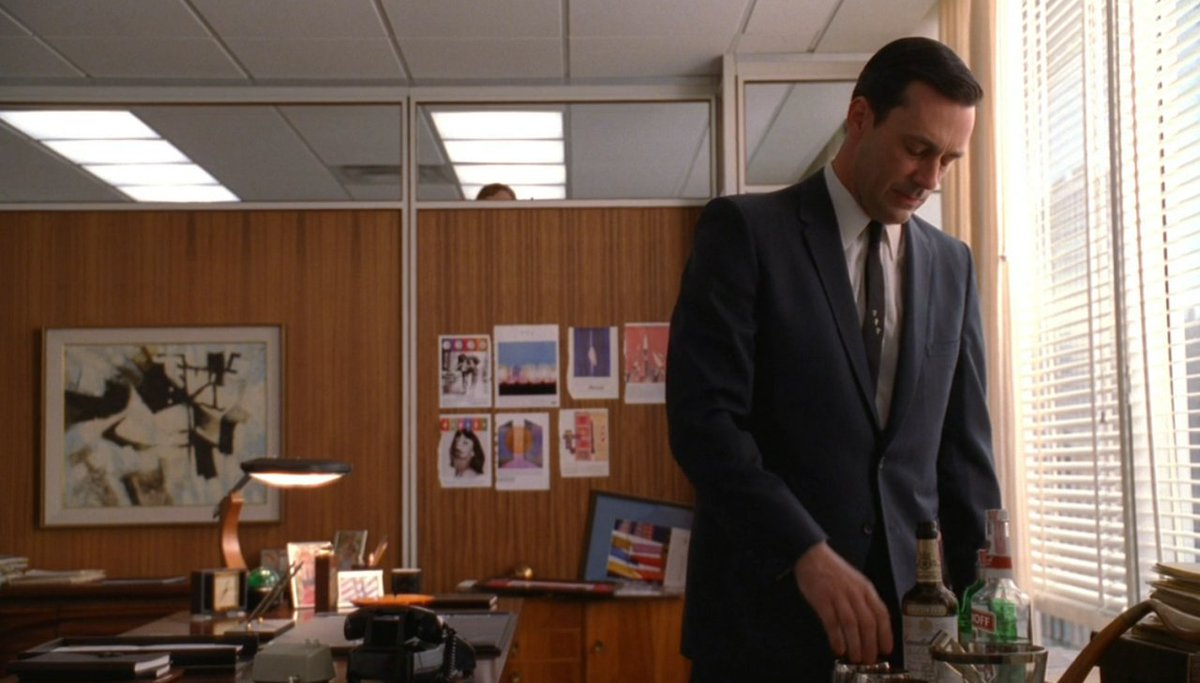A great show is one that stays with you and, for me, that’s “Mad Men.” “Mad Men” is about ad executive Don Draper and his colleagues at Sterling Cooper. The show’s premise may sound simple, but as it develops and you learn more about Don, his family and the employees at Sterling Cooper, it morphs into a complex examination of the human condition. Unlike many shows that seem to try to escape the complexities of life, “Mad Men” embraces them.
The heart of “Mad Men” is its characters. Don Draper has a place among the great characters in television history. Don never wants to let anyone in. He constantly wavers from being confident and brash when making some of the best ads of the 1960s to having a self-destructive behavior that leads him to drive his loved ones away. The distance he has is because of the many secrets about his identity that the audience gradually becomes aware of throughout the show. Another great character is Peggy Olson. She starts the show as a quiet, young receptionist from a Catholic household in working-class New York. As the show progresses, she realizes she is skilled in advertising and becomes Don’s protege. She grows from being soft-spoken to outspoken and, by the end of the show, is the copy chief of the ad firm. The final character I’ll mention is Roger Sterling. He is an aging partner at the firm whose better years are behind him. He is my favorite because his quick wit always makes me laugh and gives the show much more humor than you would expect in a drama. There are so many other characters in the show, like Joan Harris, Pete Campbell, Betty Draper and Sally Draper, just to name a few. Instead of feeling like one-dimensional characters from a soap opera, all of them are written as complicated people trying to find their own form of happiness. The show does not have explicit heroes or villains, with many characters doing terrible things throughout the show. Yet, the show does not tell the audience what to think about these characters and instead allows them to decide.
Another crucial aspect of the show is its setting in the 1960s. The ’60s were a dramatic time of change for our nation, which is a fact well reflected in the show. In the first episode’s opening scene, which takes place in 1960, Don sits in a bar while old-school ’50s music is playing. By the time the show enters its final season, which is set in 1969, its music changes to the Beatles and other popular bands of the time. The character’s taste in clothing also evolves from being more conservative at the start of the show to becoming more loose and liberated once the “swinging ’60s” have fully arrived. “Mad Men” also incorporates major historical events of the decade, like the assassination of JFK, the Vietnam War and the moon landing, by showing the audience the impact of those events on the character’s lives. Finally, the show reflects how women’s roles in workplaces changed with second-wave feminism by showing the evolution of Peggy and Joan. At the show’s start, Sterling Cooper is in a workplace full of sexism, which both characters have to navigate even when they get promoted to higher roles at the company. With the show being set in a period of great change, it allows the writers to show how these characters adapted or resisted the inevitable change that the ’60s brought.
The show’s creator, Matthew Weiner, is quoted as saying that an episode of “Mad Men” was not about what happened but how it happened. That thought perfectly encapsulates a reason why the show works so well for me. Instead of each episode being plot-heavy with life-and-death stakes, most are simply about the day-to-day lives of each character. Some may think that it makes the show boring, but not to me. The show’s slow pace allows it to feel more like the drama within our own lives. Life for most of us will probably not be like the fast-paced drama of “Breaking Bad.” For most of us, the drama of our lives could be feeling undervalued in a job like Peggy did at Sterling Cooper, or isolated from others like Don does throughout the show. Like the show’s characters, there will be periods of time when we may feel uncomfortable with ourselves and struggle to find what gives our lives purpose and happiness.
The show’s focus on its characters and the deep themes they struggle with have impacted how I view life. The show reflects how life can be dramatic, funny, sad, joyful, sometimes meaningless or even purposeful. The sensitivity and empathy the show has for its characters has challenged me to be less judgemental of others. No one is simple. Just like the characters of “Mad Men,” the more you get to know someone, the more complicated and human they become.











































































































































































































